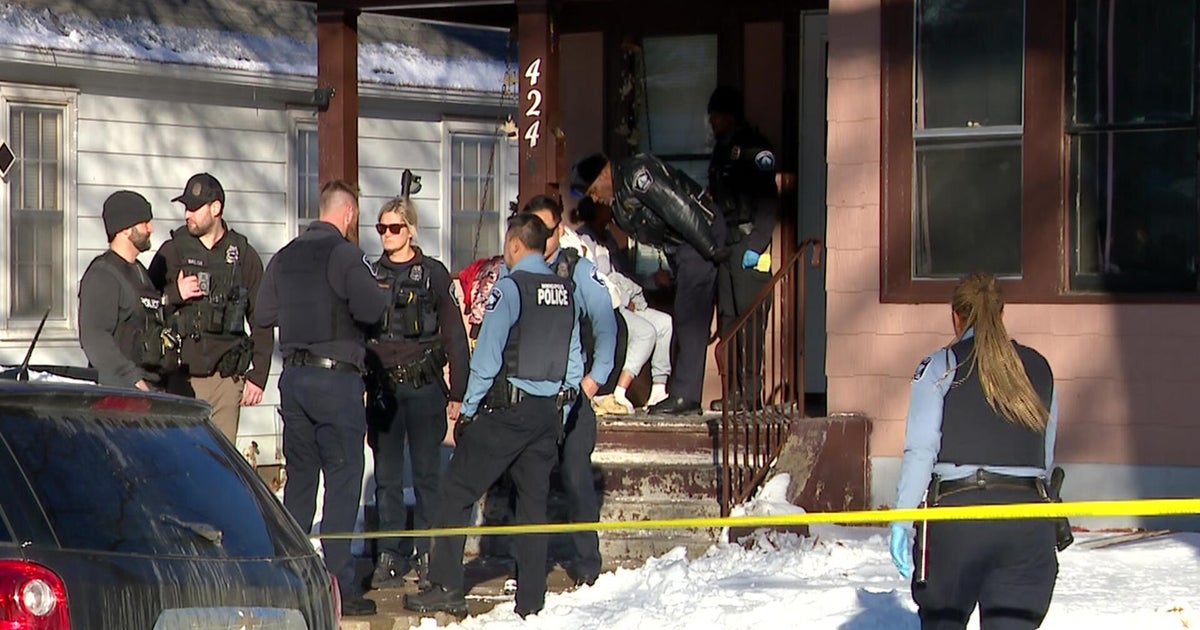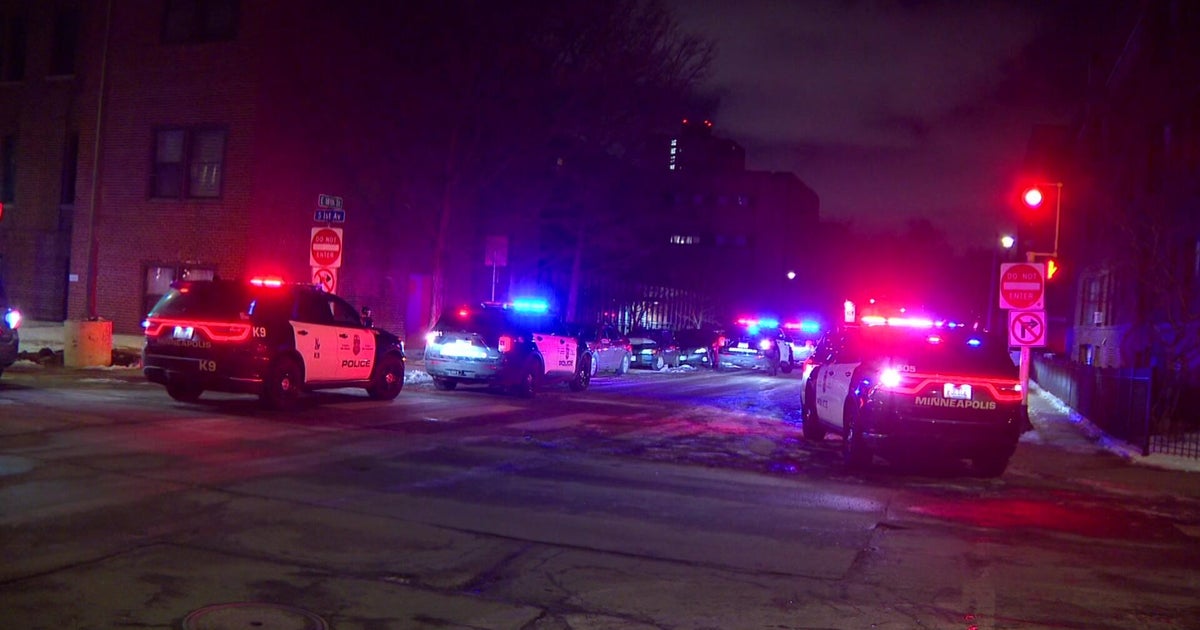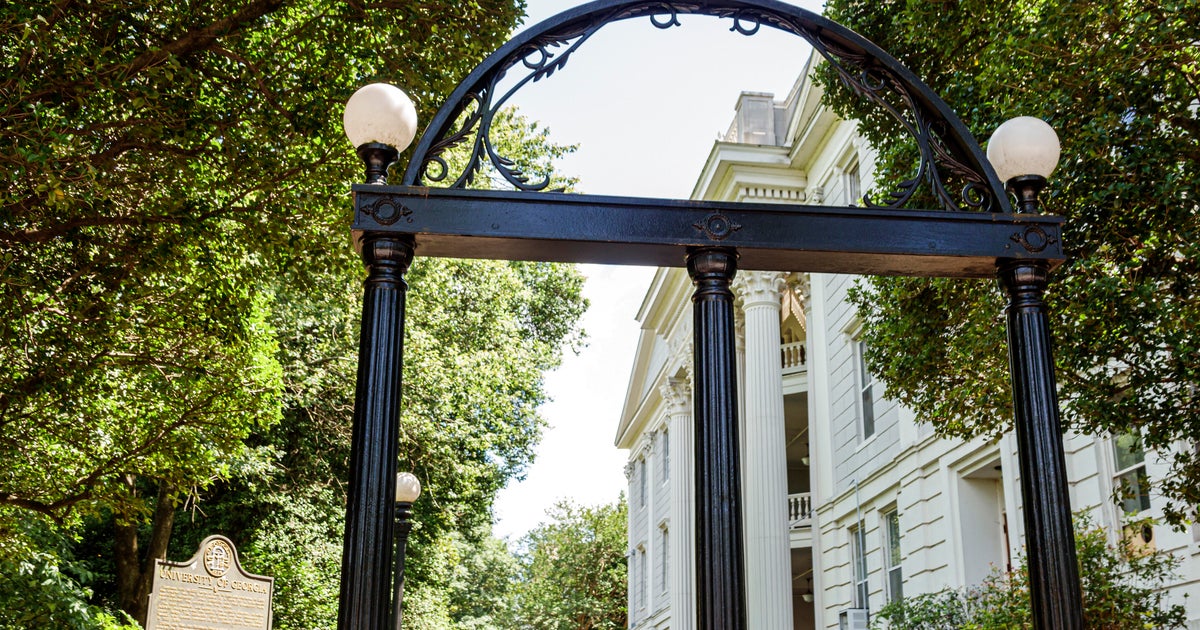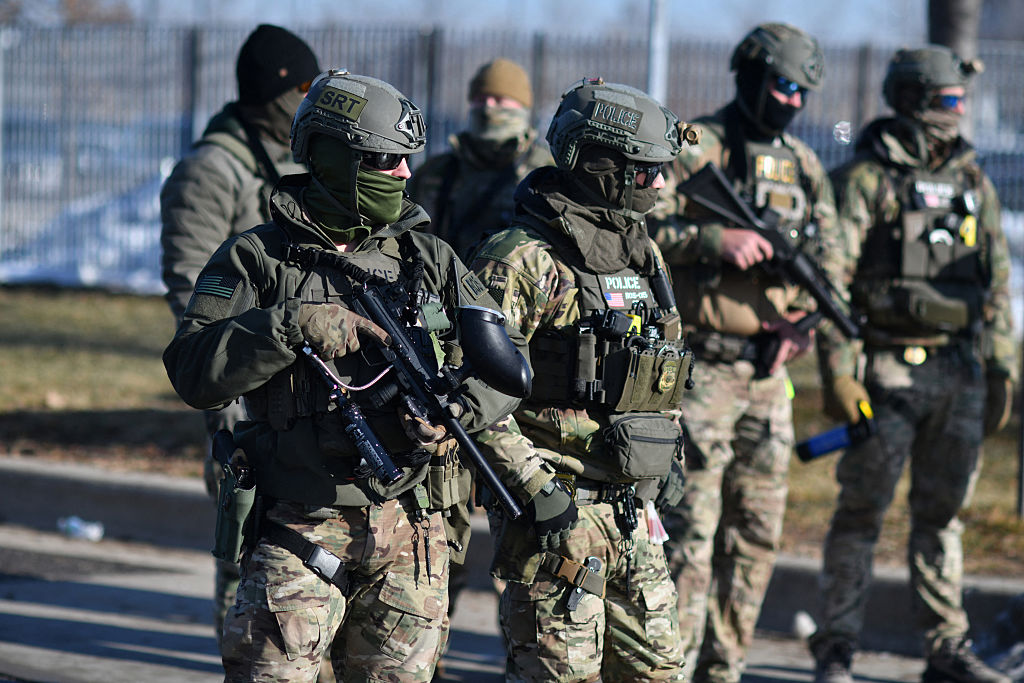Minneapolis police union leaders on the George Floyd video and systemic racism
The head of the Minneapolis police union, Lieutenant Bob Kroll, repeated his condemnation of what he calls the "riotous" conduct of the Black Lives Matter movement in an interview with "CBS This Morning" co-host Gayle King, his first since four officers were charged in George Floyd's killing.
Kroll and three fellow union leaders, Rich Walker Sr., Sherral Schmidt and Anna Hedberg, also responded to comments made by Minneapolis police chief Medaria Arradondo and shared their first reaction to the video of former officer Dereck Chauvin pressing his knee into Floyd's neck for nearly eight minutes.
Editor's note: Kroll is married to Liz Collin, an anchor on WCCO, a CBS station.
Read parts of their conversation below.
On the Black Lives Matter movement
Gayle King: You called the Black Lives Matter movement a terrorist organization. What do you mean by that?
Bob Kroll: Well our governor said it was an act of domestic terrorism during the riots and I think — anyone that watched anything occur in Minneapolis in the following week can make their own conclusion.
King: No, but I want you to respond about why — I'm taking the governor out of the conversation for a second. I want to know why you called it, the Black Lives Matter movement, a terrorist organization.
Kroll: When you see arson taking place, windows being broke, molotov cocktails being thrown, the police being shot at with live gunfire, thrown rocks and bricks at them, burning down a police precinct, the riotous conditions, that was a form of domestic terrorism, in my opinion.
Minnesota Governor Tim Walz did not call the Black Lives Matter organizers "domestic terrorists." Walz claimed the protests were being hijacked by domestic terrorists.
On Minneapolis police chief Arradondo's comments
Minneapolis Police Chief Medaria Arradondo called on the city's police union to reform the department after the killing of George Floyd. During a "60 Minutes" interview on Sunday, Arradondo blamed the police union, its contract and Kroll, for making reform difficult.
"He and others are going to have to come to a reckoning that either they are going to be on the right side of history or they are going to be on the wrong side of history. Or, they will be left behind," Arradondo said.
King: Can I get your response to what the chief said Sunday night?
Kroll: We believe that our membership, that we are elected to represent, has been unfairly scapegoated by political leaders in our city and our state and they have shifted their incompetent leadership — failed leadership — onto us and our members, and it's simply unjust. So here is our opportunity to hopefully set the record straight. We will be on the right side of history.
Anna Hedberg: Before this incident happened, we had some great conversation occurring with the city leaders and with the chiefs, and we were making some good progress on the contract. So it's just dumbfounding to me that one incident, we become the scapegoat to having a bad officer.
On the video of George Floyd being killed
King: Let's talk about the incident because it has certainly become a global conversation. I want to know from each of you what you thought when you saw the video of George Floyd and officer Chauvin.
Kroll: That's part of the problem, Gayle, is we were not allowed to see the video. The administration broke our policy, which gives us the ability to review the video, so we were blindsided. We only saw the social media video. In all other officer-involved critical incidents, we're entitled to review, and what I've seen of it is only what the public has seen on the cell phone and it is horrific.
King: How much more do you need to see to determine — to come out and say that this is not alright?
Rich Walker Sr.: Any human being that watched that knows that that shouldn't have ended the way it did, but we also know that there's more to the story. They say he never resisted in the statement's release. We don't know if he never resisted because we haven't seen from the time the officer stopped him until the point where he was on the ground.
King: Are you all saying to us that you can't really make a comment about this case until you see every piece of video associated with it? Is that what you're saying today?
Kroll: We would just like to see what we are entitled to in our agreement, in our policy, is our officer's body camera footage. It may shed some light that we're unaware of. ... Right now, we cannot make an informed decision regarding the other officers that do not appear on camera.
King: Can you understand why that answer, what you're saying right now is extremely upsetting to people who have seen this case, heard the charges, looked at the tape that we have seen? Can you understand from the public point of view why it's upsetting?
Kroll: Certainly, certainly and that's —
King: Because it feels like this, it feels like the blue wall of silence again. That we're not going to say anything negative about a fellow officer even though what you're looking and seeing with your own eyes seems especially heinous and especially egregious?
Kroll: Certainly. We would love to have seen more. We saw the initial statement from the administration, which was wrong, and this has been a failed exercise in leadership here, and we wish we could have an early opinion on this, but it is up to the administration to stick with policy and give us what we are entitled to under policy. It does look and sound horrible, I completely agree with you, Gayle.
King: How do you think the situation should have been handled with George Floyd that night?
Sherral Schmidt: I'm not one that likes to Monday morning quarterback things. If I was there I probably would have put him on his side in a recovery position once he went unconscious.
On the relationship with the black community
King: Let's address really the elephant in the room, how black people feel in your city — that black men are under siege by white police officers and that they're targeted in a disproportionate rate.
Walker: I think, absolutely, the media's push is to drum up as much racial issues and stress as there is, not acknowledging the fact — I am not denying the fact that the city needs to grow.
King: Is it a media problem? Rich, is this a media problem, you're saying? The media created this?
Walker: What I'm saying, Gayle, what I'm saying is the narrative that is being pushed in the media is that white police officers are out on these streets just to kill black men and that is absolutely farthest from the truth. Yes, we have encounters with civilians in the city that turns for the worst, and that's my actual problem with some of what Black Lives Matter — I actually believe in what Black Lives Matter stands for, but it should stand all the time, not just when a police officer or a white police officer or an Asian police officer has a fatal encounter with an unarmed person. ... We are not defending the actions of Mr. Chauvin. What happened to Mr. Floyd is a tragedy. ... But we weren't out there, and what we're saying is, the narrative needs to stop. It needs to stop. Police officers are not out here just randomly hunting black people to kill them. That's terrible.
On racism in the police department
King: Bob Kroll, do you think there's a systemic racism problem in the Minneapolis police force?
Kroll: I do not. Racial issues certainly need to be addressed, and we are willing to work through that as we have done in year after year. Many years in the police department, we are all engaged. ... There are racial issues. Is it systemic racism? Not in my opinion.
Walker: A lot of people are throwing systemic racism in our police department. I can tell you as an African American male, I personally do not believe this exists. ... Our city council is very diverse, we got a black attorney general, we have a black police chief, I am the first African American ever elected to the Minneapolis Police Federation in 152 years, and you know what I see? I see progress. We're progressing forward.
King: I think it's very hard — the only people I hear saying there's no such thing as systemic racism in the police department are police. ... I don't know how you move forward unless there's some acknowledgment about what people believe.
Hedberg: We can definitely acknowledge that people think and perceive that there's systemic racism because that is all that is being said about law enforcement today.
King: Right, right —
Hedberg: I mean it's really difficult to come up with the answer to seeing something so horrific.
King: Do any of you think there need to be reforms in the police department?
Kroll: Certainly. Absolutely. Yes, and we want to be a part of that.
King: What would you change?
Kroll: I think we would be better served by listening to what the community wants to see changed, and then work with them to implement that. ... I think the first thing that we need to do is sit down with community leaders and listen.
On George Floyd
In a private letter to union members, Kroll said, "What is not being told is the violent criminal history of George Floyd." Critics have accused Kroll of victim-blaming.
King: You brought up George Floyd's past history. What was the purpose in bringing up his past history?
Kroll: Well, I did not bring that out in public, and you need to understand the context. Our officers had been literally under fire. They had been shot at five times in the five following days post his death. ... And it wasn't any intent of mine to question his history. ... The context of that was a scribbling of what we as a board had been working on and doing and a morale builder because our department had completely suffered a devastating hit to their morale, particularly when the third precinct was given away. ... And I sent an email to the membership, period, and that was not intended to go any further.
King: But see, Bob, that's the thing. ... You're calling it a morale builder. The city's on fire because they feel this man has been murdered by a police officer. ... What is the purpose in bringing that up?
Kroll: I didn't even bring the criminal history up.
King: So you're saying, it was a private note?
Kroll: That was one small segment of a very lengthy letter, and it doesn't say anything about what's contained in the criminal history.
On police officers being fired
King: Under what circumstances, Bob, do you think a police officer should lose his or her job?
Kroll: Should lose?
King: Should be fired.
Kroll: That's just a wide — I'm sorry, but that's just a wide-open end of hypotheticals that I couldn't begin to answer. I'm sorry.
King: Is it so wide?
Kroll: We could sit for the rest of the week and play out scenarios where they could and should lose their job. ... There's a false narrative out there also that we appeal and fight all discipline and win it, and that's simply not true.
On the case against the charged officers
The Minnesota Police and Peace Officers Association, which represents 10,000 public safety officers across the state, works closely with the Minneapolis police union. Executive Director Brian Peters also spoke with King about the way forward.
King: So you're paying their legal costs for all four of the officers?
Peters: Yes all four officers are covered under the legal defense fund. Every citizen has a right to due process and it just has to play out.
King: What to you would be a fair outcome in this particular case? I know it's not up to you. I get that.
Peters: Is there a fair outcome? I don't think there is. The facts of the case have not come out, and that will come out in a criminal trial, but it's not for me to say. I think officer Chauvin — he betrayed the badge, and there is no excuse for it.
King: Can you talk about the morale, the mood among the officers?
Peters: Minneapolis is suffering. ... This is, to me, a systemic problem with the entire leadership. ... The expectations that are put on cops these days is enormous. Deal with mental health, give it to the cops. You know, drug mental health, give it to the cops ... Police officers have to try to put bandaids on systematic issues, and it's overwhelming.
King: Do you see this, Brian, as a black and white issue? Because the black community certainly does.
Peters: I never saw black and white when I was on the street.
King: I think it's great that you said you don't see it as black and white, but what you know about police officers, do you think for them it is a black and white issue, that white officers are either afraid or they're uncomfortable when they're dealing with black people on the streets? Do you think there's any truth to that whatsoever?
Peters: Police officers are forced to again deal with societal issues that they can't fix in 20 minutes, and we need to be looking at all of the other systemic things that create that divide between a white officer and a person of color. ... We're still pointing fingers at this point and not doing anything that we need to be doing.



